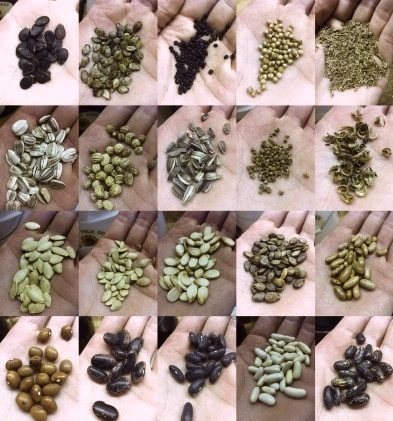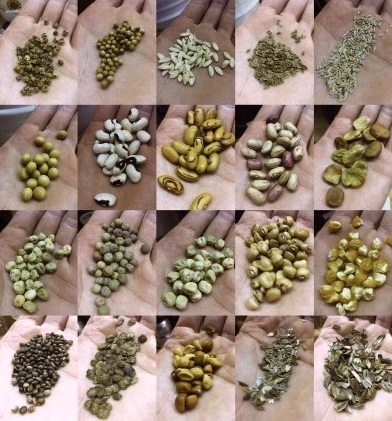WHAT DOES THAT MEAN?
You’re being relieved of greater food freedoms. Your right [/one_half] [one_half_last][box] This article written by Amber Fields is republished here from UK Issue 7 of Garden Culture Magazine. It originally appeared under the title, Seed Diversity & Food Sovereignty.[/box][/one_half_last]to grow food without purchasing or seeking permission, to save seeds from your garden, is in jeopardy. A dilemma that stems from the patenting of ornamental plants and steady profits.
“Few gardeners comprehend the true scope of their garden heritage, or how much is in immediate danger of being lost forever.” — Kent Whealey, Seed Savers Exchange
Now, it is one thing for the breeder of bushes and posies to license his years of labor in arriving at new coloration or growing trait that cannot be reproduced from the seed said plant generates. But it’s totally different when the patent office hands legal ownership of food propagation over to a global corporation. But said ornamental plant breeder wouldn’t likely hunt down, and sue, the average gardener for dividing up a clump that’s lost vigor, or outgrown its space. If you propagate patented ornamental plants, and start selling them though, the plant police just might arrive.
However, most plant patents, whether edible or ornamental, are owned by the Big 6 – you know, that handful of transnational corporations: Monsanto, Dow, Syngenta, DuPont, Mitsui, and Aventis. These companies control 98% of the seeds worldwide, not just farm seeds, but home garden seeds too – fruits, vegetables, flowers, shrubs, etc. These entities go out of their way to find anyone infringing on their rights and their profits. Your food sovereignty is of no interest to them.
NON-PATENTABLE PLANTS EVICTED
 In the early 1980s there were 5,000 different cultivars of fruits and vegetable listed in seed catalogs. Today there are only 500, because that old stuff won’t turn big annual profits. After being acquired by Monsanto, Seminis actually removed some 2,000 heirloom plants from the market, all quietly stored away in corporate seed banks where they will turn to dust.
In the early 1980s there were 5,000 different cultivars of fruits and vegetable listed in seed catalogs. Today there are only 500, because that old stuff won’t turn big annual profits. After being acquired by Monsanto, Seminis actually removed some 2,000 heirloom plants from the market, all quietly stored away in corporate seed banks where they will turn to dust.
That’s a huge loss of seed diversity. They can’t patent and control them. Your ability to save seed, and enjoy the same crop year after year isn’t good for business. There’s no money in that – not from the seed itself, or the special plant pesticides the Big 6 makes to help you bring in a modified harvest successfully.
BIG AG WANTS TO MONOPOLIZE HOME GARDEN PLANTS?
Do the math. It’s an ever-growing market of some $36 billion dollars today, and expected to surpass $50 billion by 2018. Since life itself depends on seeds, this foolproof market spells big profit every year perpetually. Every living thing on Earth needs to eat, and food starts with a seed, or is sustained by things that come from seed. They’re after everything on your plate that you grew too.
These corporations can destroy you financially for ignoring their patent rights. They hire people to track down anyone growing their plants without permission. Propagating patented plants from seeds or cuttings is theft. You have to pay for the right to grow them.
THIS IS A GLOBAL PROBLEM
Monsanto and Syngenta already own more than 50% of seed varieties of tomato, paprika, and cauliflower registered in the EU. In this arena, Enza Zaden and Bayer-owned Nunhems are actively patenting food plants, which abruptly quadrupled in recent years. While many believe that patenting plants requires genetic modification, late 2013 – early 2014 saw the EPO granting patents on conventional hybrids, which is possible in the US and Canada too. Monsanto tried to get an EU patent on a regular garden cultivar in 2014 too, but they tossed out the application for presenting fraudulent evidence.
IT’S NOT JUST THE MEGA COMPANIES
Burpee Seeds’ owner, George Ball, is upset over his century-old company being labeled as unsafe to purchase from, yet he refuses to sign the Safe Seed Pledge. Not because he has lost control to Monsanto’s subsidiary Seminis (the world’s largest developer of all fruit and vegetable plants), but because he doesn’t ‘know’ the people behind the pledge. A typical Ball point of view, the Center for Responsible Genetics didn’t spring from his plantsmen realm.
But you really have to take the Safe Seed List with a grain of salt, because it includes Seeds of Change – a company owned by candy giant, Mars, Inc. Surprised? Don’t be, it’s a subsidiary acquired for mapping the cacao tree genome. They say it’s to make the crop sustainable, but some entity will modify that genome, patent their improved version, and control the cacao bean industry. It’s the obvious outcome in today’s world.
SMALLER WHALES JOIN THE CLUB
 Buying seed from Gurneys, Henry Fields, or Thompson Morgan US? Ordering organic inputs from Gardens Alive? These are all owned by catalog monopoly king, Niles Kinek under the Scarlet Tanager and IGP Acquisitions umbrellas. Amassing a dozen well-established plant businesses gives you incredible knowledge and breeding talent, so it’s no surprise that this conglomerate dove into the patented food plant pool with a 2014 application to the U.S. Patent Office for a new variety of grapes crossed with muscadines.
Buying seed from Gurneys, Henry Fields, or Thompson Morgan US? Ordering organic inputs from Gardens Alive? These are all owned by catalog monopoly king, Niles Kinek under the Scarlet Tanager and IGP Acquisitions umbrellas. Amassing a dozen well-established plant businesses gives you incredible knowledge and breeding talent, so it’s no surprise that this conglomerate dove into the patented food plant pool with a 2014 application to the U.S. Patent Office for a new variety of grapes crossed with muscadines.
Seed industry consolidation has many layers and purposes. You cannot be overly selective when choosing where to buy seeds. Monsanto’s purchase of Seminis in 2005 made ensuring your seed order doesn’t support their interests harder to track. The Safe Seed list includes companies who do sell seed from Seminis. But as J.W. Jung states on their website, the named varieties procured through Seminis they offer are not GMOs, just well-known old varieties in big demand. Seminis has been around a long time, and controls many beloved garden fruits and vegetables, some since the 1950s when it was known as Petoseeds.
STICKING STRICTLY TO HEIRLOOM SEEDS?
This isn’t the answer to preserving seed diversity. Thanks to trademarks, we have plants known by several names. One seed company with a trademark on a certain heirloom plant name can market the plant as such, while the rest of the garden catalogs must list it under a different name. Talk about confusion. How would anyone know the real identity of the plants we’re growing? You think they’ve preserved several similar things, when they are really all the same. So, we actually have less diversity than it seems.
IT ISN’T TOTALLY HOPELESS
Some concerned plant breeders recognize the dangers. They’re working to preserve your food sovereignty and seed diversity. Their plan launched in April 2014 with the Free The Seed campaign held at the Wisconsin College of Agriculture introducing the Open Source Seed Initiative. Getting seed here requires signing a pledge that you will only grow food with it, and that no portion of said plants, or their seed, will be modified – genetically, or otherwise. You also have the right to save the seeds from your garden.
Learn more:
UPDATE…
This article is based on information available over a year ago. However, the work in genome mapping and gene splicing hasn’t stopped or slowed since then. If anything, the pace has increased – most especially where the #1 consumed vegetable in the world is concerned. Patented tomatoes for your backyard garden are closer than you think. This article, The Tomato Genome’s Impact on Plant Patenting, was published just two days ago on Earth and Table Law Reporter. And patented zucchinis are on the horizon too.
The Open Seed Initiative refers to currently on the market seeds for food crops as indentured seed. How apropos! This handful of mega corporations, along with their up and coming new club members, have enslaved the planet’s food sources, and in turn, every living domesticated animal and person on Earth too. One day, there will be no such thing as food sovereignty. Unless, of course, someone or some group develops the power to stop what’s happening. Consolidation in the home garden seed industry makes that more difficult with each passing year.
Images courtesy of Gorilla Garden Adventures (top), and Sow True Seeds (seeds).